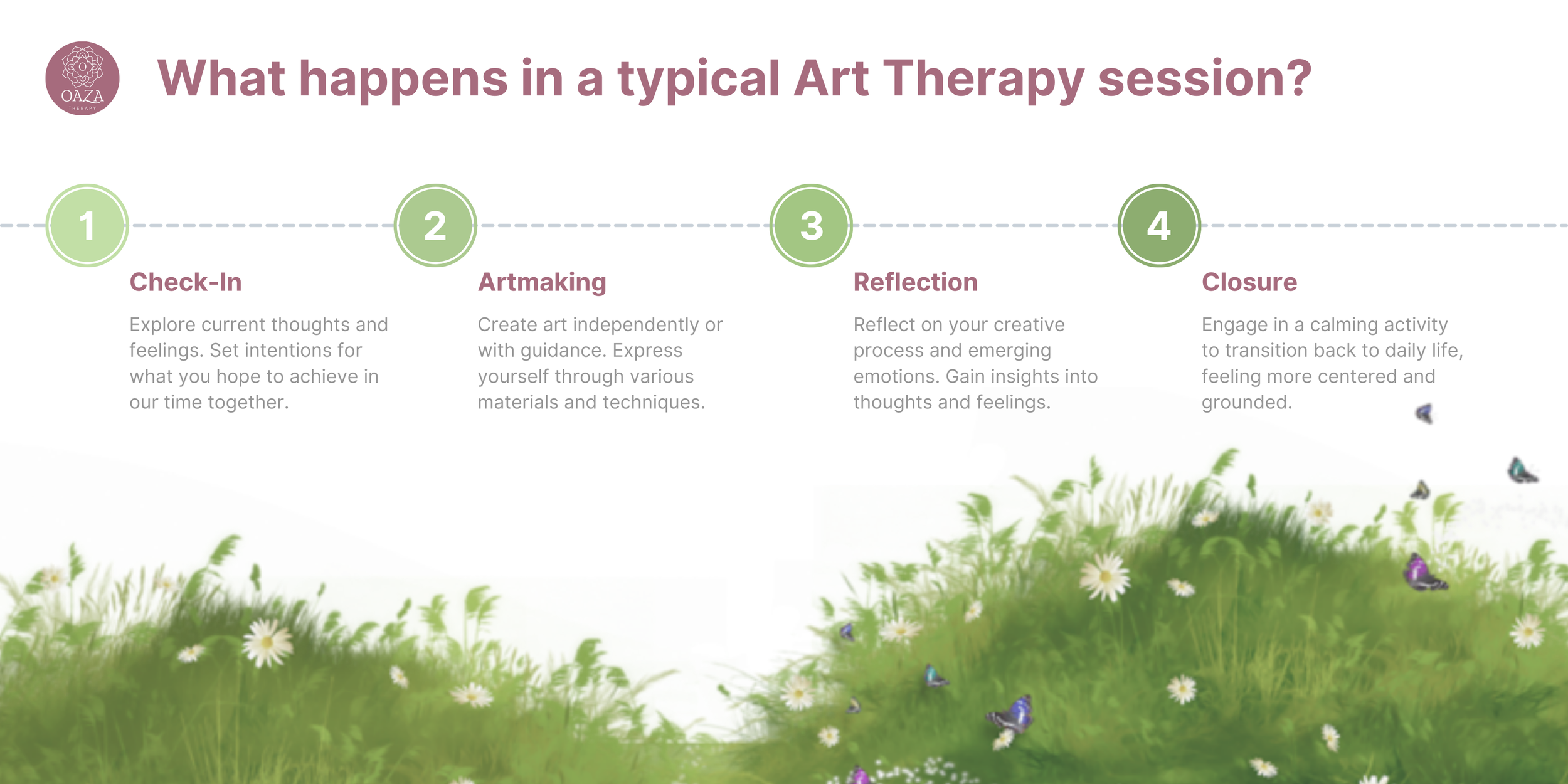
Services
Individual Art Psychotherapy (In-person or online)
180 SGD for 50-minute session | 270 SGD for 75-minute session
Package rate: 750 SGD for 5 sessions of 50-minutes each
Family Art Psychotherapy (In-person only)
240 SGD for 50-minute session | 360 SGD for 75-minute session
Art Psychotherapy
Workshops & Collaborations
(Please contact for details)
Available upon request for group experiences and professional development. These sessions can be customized to meet the needs of organizations, teams, or specific groups interested in exploring therapeutic approaches in a collective setting.
What is Art Therapy?
Art Psychotherapy, also known as Art Therapy, is an evidence-based therapeutic approach that combines artistic expression with psychological principles. Art Therapy transcends language barriers, processes experiences via sensory and tactile engagement, accesses emotions through metaphor and symbolism, builds new neural pathways, and activates whole-brain healing.
How can Art Therapy help you?
💗 Mental & Physical Wellbeing
🌊 Coping with Stress & Anxiety
🌱 Processing Trauma
😊 Mood & Self-Esteem
🧠 Emotional Intelligence
🧩 Brain & Cognitive Function
🤝 Social Communication Skills
🎨 Freedom of Self-Expression
🏔️ Improved Resilience
💪 Feeling Empowered
🔄 Enhancing Mindfulness and Presence
❤️ Strengthening Self-Compassion
Evidence-based benefits of Art Therapy
Decades of research and clinical practice have demonstrated the following key benefits:
Significant Stress Reduction: Engaging in artmaking can lower cortisol (the body’s primary stress hormone) by up to 75% in just 45 minutes, offering rapid relief from everyday stressors and promoting a sense of calm (Begamatova, 2025; Kaimal, 2016), especially for students with special needs (Lavric & Soponaru, 2023) and individuals diagnosed with anxiety disorders (Hamzah & Ghazanfer, 2023).
Mood Enhancement and Emotional Resilience: Art Therapy stimulates the production of dopamine and serotonin, neurotransmitters linked to improved mood, emotional balance, and resilience. This boost in “feel-good” chemicals helps individuals better manage emotional challenges and foster a more positive outlook (Begamatova, 2025; Malchiodi, 2012).
Effective for Anxiety, Depression, and Trauma: Numerous clinical trials have shown that Art Therapy significantly reduces symptoms of anxiety and depression across diverse populations, including children (Wu & Chung, 2023; Moula, 2020), patients with stroke (Alwledat et al., 2023), cancer patients (Czamanski-Cohen & Weihs, 2023), trauma survivors, the elderly, and individuals with postpartum depression (Joschko et al., 2024; Hu et al., 2021). It provides a safe, non-verbal outlet for processing difficult emotions and experiences, supporting psychological healing and recovery (Van Lith et al., 2013; Slayton et al., 2010).
Improved Emotional Processing and Social Skills: Art Therapy encourages self-reflection and emotional awareness, which can lead to healthier social interactions and relationships. It is especially effective in helping students with special needs (Lavric & Soponaru, 2023), trauma survivors and individuals with autism spectrum disorder to improve communication and social functioning (Shukla et al., 2022).
Enhanced Cognitive Function and Self-Esteem: Creative activities in Art Therapy are linked to better cognitive performance, including memory, attention, and problem-solving skills. Participants often report increased self-esteem and a stronger sense of identity as they explore and express their inner world through art (Hu et al., 2021; Curl, 2008). Art Therapy also stimulates new neural connections through creative engagement, improving self-esteem, emotional regulation, coping skills, and overall wellbeing (Strang, 2024).
Versatile and Adaptable: Art Therapy can be tailored to meet individual needs and goals, making it suitable for people of all ages and backgrounds. It is widely used as both a complementary and standalone treatment in clinical psychology, educational settings, and community programs (del Río Diéguez et al., 2024). Contemporary research and practice emphasize the importance of cultural relevance and adaptability, ensuring that Art Therapy approaches are sensitive to the unique needs of different populations and can be effectively applied in both local and international contexts (Kapitan, 2025; Lay, 2018).
Do I need to be good at art to benefit from Art Therapy?
No, you don't need any artistic skills to benefit from Art Therapy.
It's not about creating beautiful art – it's about using art to express yourself and explore your thoughts and feelings.
The process of making art is what matters, not how good it looks or whether someone else would like it.



